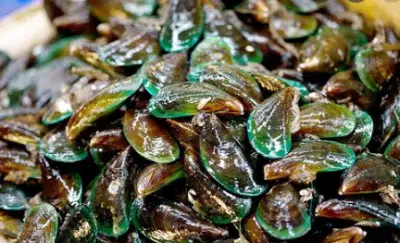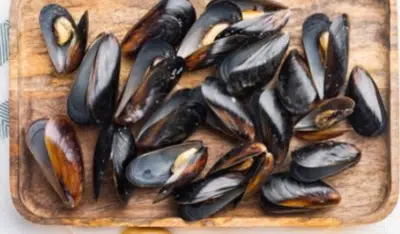You can easily store mussels in the freezer, but specific steps need to be followed right, and you have to know how well to do it. This article will answer your question: Can you freeze mussels to keep their taste, texture, and flavor.
Mussels are a source of good protein, and you can store them in the freezer if you cannot use them all in one sitting. You can freeze mussels and store them for up to four months. When freezing mussels, do not shell them. Wash thoroughly and place in freezer-safe bags.
One of the ways to do this is by spreading the mussels on a cookie sheet uncovered in the freezer until they are individually frozen. Then put the frozen mussels into one gallon sealed freezer bags and store them in a freezer till it’s time to use them.
Although the flesh may turn mushy after thawing, you can use them in soup or pasta sauces, where their taste and texture will be sufficiently disguised.
Are Frozen Mussels Good?
 When mussels are frozen properly, they can be as good as a fresh mussel. Frozen mussels are typically frozen within hours of being pulled from the sea and only after a rigorous quality control process.
When mussels are frozen properly, they can be as good as a fresh mussel. Frozen mussels are typically frozen within hours of being pulled from the sea and only after a rigorous quality control process.
Although, many variables make this an uncertain subject. These variables are not limited to temperature, length of time thawed during preparation, and personal taste.
Meanwhile, Frozen mussels will taste as good as fresh mussels if they’re cooked right. Frozen mussels are packaged and then cooked, in the bag, to be pasteurized and stored in the freezer. Frozen mussels are convenient to have on hand, but they need to be thawed first before you can use them.
Also, it provides a versatile and inexpensive way to add seafood to soups, stews, and chowders. Mussels are also delicious with butter, garlic bread crumbs, and white wine. Because they have a high water content, mussels have a short shelf life and are generally unavailable live in stores. As a substitute, keep frozen mussels on hand for that last-minute seafood craving.
In general, the top quality of fresh mussels is higher than that of frozen mussels. Therefore, it is recommended to choose fresh whenever possible. After purchase, most shellfish should be stored in the freezer as soon as possible and kept below 0 degrees Fahrenheit. It will keep them safe until ready to use.
How to Freeze Mussels
No products found.
Seafood is one of these perishable foods that you must know how to use in the right way. Otherwise, its taste can be very unpleasant. That’s why you need how to freeze mussels without ruining the taste and without damaging the texture.
Fresh Mussels
Store fresh mussels in the refrigerator in a bowl of lightly salted water to keep them healthy until you plan to cook them. Mussels are the easiest shellfish to freeze, and they can be stored frozen for up to three months. This simple, four-step method will help you prepare your mussels for freezing, so they can taste as delicious as when they were fresh.
The longer mussels are kept alive out of the water, the longer they have to die. For this reason, you should usually eat them raw, just-steamed, or even frozen.
Cooked Mussels
Mussels are tender shellfish that are easy to overcook. Enjoy fresh mussels right out of the shell as soon as possible after purchase, so they taste their best and have the most nutritional value. If you plan to freeze cooked mussels, it’s best to cook them before placing them in freezer bags or containers for later use.
Place fully cooked mussels on a baking sheet in an even layer and freeze for about two hours. Place frozen mussels in a plastic bag or container, and return to the freezer. Cooked mussels will keep in the freezer for up to three months.
Tips on freezing mussels
1. Do not freeze mussels in the shell – freezing and thawing fresh mussels in the shell can cause the shells to open, allowing water to accumulate inside, resulting in a rubbery texture.
2. To freeze mussels, peel the flesh from the shell. Take care to remove all of the small tough muscles that attach each half of a mussel shell to one another, as well as any membranes or grit still attached to the flesh. Discard empty shells, rinse flesh under cold running water, then pat dry on a paper towel.
3. Wrap each portion of prepared mussel meat separately with plastic wrap or freezer paper, being careful to remove air from it.
4. Transfer wrapped mussel portions to an airtight container or freezer bag and seal tightly
5. You can Freeze for at least one month
How to Defrost Frozen Mussels?

While fresh mussels are the best choice, sometimes they may not be available. While not as fresh-tasting, frozen mussels offer the same nutrients and health benefits as fresh mussels.
The package should be tightly sealed for frozen mussels without any air pockets. Frozen mussels should be held at -5°C (23°F) to 0°C (32°F). They usually come pre-packaged and need only to be defrosted for proper use in cooking. It is best to defrost mussels in your refrigerator in their original packaging. Place them at the bottom of your refrigerator on a plate or pan if they leak liquids during thawing. You should use it within 2 or 3 days after thawing.
Generally, It is best to defrost the mussels in the refrigerator overnight or start them in the morning and then move them to room temperature an hour before cooking in the evening.
Note: Mussels tend to retain more liquid when thawed, so be sure to drain excess liquid before proceeding with your recipe as you would normal fresh mussels.
Can You Freeze Live Mussels?
Most seafood professionals will tell you that freezing live mussels is optimal to keep them fresh at home. However, freezing is a better option for those who want to keep a bunch of mussels around for an extended period. Cold temperatures also slow down the respiration rate and metabolism of the mussels, allowing them to stay alive for weeks.
You can freeze live mussels as it is safe to do so. Put the mussels in an airtight bag, remove as much air as possible, and freeze them straight away. When ready to cook them, do not thaw them – use them directly from frozen in your recipe.
I’d suggest running cold water over them for about 30 minutes first, then draining them and putting them in a zip closure bag. If you do that and freeze them as soon as possible after purchase, they will keep for months.
The same rule applies: freeze your mussels when they are at peak freshness, but don’t wait too long, or they’ll start to go bad while frozen.
Can You Freeze Mussels in White Wine Sauce?
You may freeze mussels in white wine sauce in plastic containers or heavy-duty freezer bags. To use frozen mussels in white wine sauce, thaw overnight in the refrigerator. Just make sure the wine is not too tart as it will be more acidic after freezing/thawing, and stick to full-bodied white wines for never-fail results.
It’s also a great idea to use a ziplock bag to let out any air before putting it in the freezer. The mussels in white wine should not be frozen for more than three months.
A great sauce to freeze is parsley, garlic, and white wine. For most mussels in white wine sauce, you can freeze them and reheat them effectively. However, you will lose some moisture, and they may not be as fresh tasting.
It also depends on how long you have been keeping them in the sauce and if it has been refrigerated or sitting out on the counter. As a general rule, it is best to freeze anything that has not been properly stored first.
Can You Freeze Cooked Mussels in Their Shell?

Just remember that seafood tends to get mushy when thawed, so they’re better saved for soups or chowders instead of being eaten as appetizers.
However, you need to ensure that the mussels are still in good condition (alive, fresh, and not spoiled). For example, if the mussels are cooked and frozen after cooling or thawing, the quality may not be maintained. However, it would be fine if you were only freezing them to preserve them for a few days.
Can You Freeze Mussels After Cooking
Because mussels are so delicate in taste, they are generally eaten as soon as ready. However, if you have too many, or if you don’t eat them all or if you go on holiday and take some raw mussels with you, you can freeze them before or after cooking.
Cooked mussels can be frozen for one month. However, their texture will become mushy once thawed. Fresh mussels – if cooked, need to be refrigerated immediately if not consumed and can be refrigerated for up to two days cooked. Do not freeze cooked mussels. Freezing will destroy the texture and taste of these seafood gems.
Cold cooked mussels turn the adductor muscle inside the shell firms. While cold water cooking is not used nearly as wide as hot water, it brings its qualities to the table. The meat is juicy and succulent, smooth and sweet in flavor, has a light and fresh taste.
Many people have found that they prefer cold water mussels, especially after getting a better idea of what to do with them. Because it is often more convenient to cook mussels in their shells under hot water and then stuff them with other ingredients, it can be useful for those who want to prepare cold water mussel dishes first give them a quick hot bath.
Can You Freeze Cooked Clams and Mussels?
You definitely can freeze cooked clams and mussels! They will preserve for up to 3 months in the freezer. Secure the clams and mussels inside a freezer-safe container or freezer bag
Cooked clams and mussels can go freezer burn if not stored properly and frozen for too long. To avoid this, vacuum pack them for the freezer, store them between layers of plastic wrap, and make sure they’re in an airtight container.
Note: Clams, oysters, and mussels are a select group of delicious seafood delicacies that can be kept frozen for later use. Before freezing any seafood, it needs to be cooked. Cook them until the shells open (discard those that do not), then submerge the cooked seafood in cold water or ice to cool down.
Can You Freeze Mussels Before Cooking?
The best way to store mussels before cooking is to keep them moist in a leak-proof bag and keep them on the coldest part of your refrigerator, which is usually the bottom shelf.
You can freeze mussels before cooking if you vacuum package them. However, if you were cautious with frozen mussels, they can go very mushy because they are filter feeders. Even in a live state, they have a high volume of water that won’t be released until they are cooked. So keep that in mind when thawing them as well.
Meanwhile, freezing them will accelerate the aging process and deteriorate their quality. Eat them within a year of freezing.
How Long Can You Freeze Cooked Mussels?

If you choose to freeze uncooked mussels, they should be placed in a food-safe plastic bag and submerged in water with an inch of space between the top of the water and the top of the bag and then frozen right away.
Although, it’s not always the best option. Freezing requires that you don’t cook them for too long before freezing them so that when you do reheat them, they don’t become overcooked.
How long can you keep mussels in the fridge?
If properly stored, mussels can be kept fresh in the refrigerator for 2-3 days after purchase. After that, mussels should be covered and stored in the fridge until you are ready to eat them. Once opened, try to use them within 3 days.
To extend the shelf life of cooked mussels, freeze them; freeze in covered airtight containers or heavy-duty freezer bags.
However, if you plan to use them to make mussels in white wine or seafood chowder, they are best used immediately after purchasing.
Conclusion
Can you freeze mussels? You really can freeze mussels, and the process is fairly simple. However, to do so, you’ll need to be sure that you’re picking healthy mussels. That is to say, they should be unopened and firmly closed (not stuck together), and they shouldn’t smell “fishy.” If you can find these kinds of mussels, then it’s fairly straightforward

Equipment
- 1 Pot
Ingredients
- 3 tablespoons extra-virgin olive oil
- 2 shallots
- 4 garlic cloves
- 2 pounds mussels
- 1 cup dry white wine
- 1/2 cup heavy cream
- 4 tablespoons butter
- 1/2 parsley
- Kosher salt
- Crusty bread
Instructions
- In a big pot, heat the olive oil on medium-high.
- Shallots and garlic should be added and cooked for about 5 minutes, or until tender.
- Add salt to taste before adding the mussels, wine, cream, butter, and parsley.
- Give it a good swirl, cover the saucepan, and cook for 10 to 15 minutes, or until the mussels open and are cooked through.
- Serve the mussels with their juices in two dishes and crusty bread.
